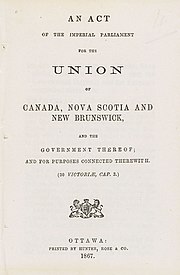| R v Coote | |
|---|---|
 R v Coote was the first decision of the Judicial Committee interpreting the British North America Act, 1867 | |
| Court | Judicial Committee of the Privy Council |
| Full case name | Our Sovereign Lady the Queen v Edward Coote |
| Decided | March 18, 1873 |
| Citations |
|
| Case history | |
| Appealed from | Quebec Court of Queen's Bench |
| Court membership | |
| Judges sitting | |
| Case opinions | |
| Provincial statute authorising inquiries by fire commissioners within provincial authority. Statements could be used in criminal prosecution. | |
| Decision by | Sir Robert P. Collier |
| Keywords | |
| Provincial inquiry power; Admissibility of depositions | |
R v Coote is a Canadian constitutional law decision in 1873 dealing with the powers of the provinces under the British North America Act, 1867 (now the Constitution Act, 1867).[1] The point in issue was whether Quebec had the constitutional authority to create a mandatory inquiry power for provincial fire commissioners.
The case was ultimately decided by the Judicial Committee of the Privy Council, at that time the court of last resort for Canada within the British Empire.[2] It was the first decision by the Judicial Committee analysing the division of powers under the Constitution of Canada.
The Judicial Committee held that the mandatory inquiry power was within provincial authority. The Judicial Committee also held that evidence given by an individual in response to a mandatory inquiry could later be used as evidence against that individual in a criminal prosecution for arson.[3][4]
- ^ Constitution Act, 1867, 30 & 31 Victoria, c. 3. (U.K.).
- ^ James G. Snell and Frederick Vaughan, The Supreme Court of Canada: History of the Institution (Toronto: Osgoode Society, 1985), p. 42.
- ^ The Queen v Edward Coote [1873] UKPC 26, (1873) LR 4 PC 599 (18 March 1873) (on appeal from Quebec); reprinted, Richard A. Olmstead, Canadian Constitutional Decisions of the Judicial Committee (Ottawa: Queen's Printer, 1954), vol 1, p. 1–10.
- ^ Reg v Coote (1873) 9 Moo PC NS 426, 17 ER 587 (6 February 1873)